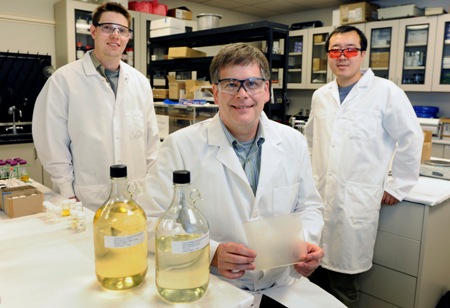Researchers from North Dakota State University (NDSU) have declared that the development of bio-based resins have the potential to transform present resin and coating technology.
The technology developed by them will allow a number of US-grown crops to be used in the fabrication of these coatings and resins. The renewable raw materials-based resins are developed to prevent the use of compounds such as bisphenol-A and formaldehyde that harm the environment.
 Dr. Dean Webster, North Dakota State University, Fargo, (center) and graduate students T.J. Nelson and Xiao Pan, are among a research group that developed resins from renewable raw crop materials.
Dr. Dean Webster, North Dakota State University, Fargo, (center) and graduate students T.J. Nelson and Xiao Pan, are among a research group that developed resins from renewable raw crop materials.
According to Dean Webster, a professor in the Department of Coatings and Polymeric Materials in NDSU, and the head of the research group, vegetable oils and sucrose based resins can be used in diverse applications across several industries. The NDSU research group has used sunflowers, flax, plus oil from soybeans, and sugarbeets in the development of resins and they found that the new resins have significantly improved the level of green material content, have similar mechanical properties of materials developed from petrochemicals and appreciably improved properties when compared to the present bio-based processes and materials.
The novel resins formulated by NDSU researchers do not depend on materials based on petrochemicals, which is generally a main component in many formulations and coatings. The research also has established that epoxidized sucrose ester resins developed by them produce materials that are at least two to four times functionally efficient than resins that are based on vegetable oils.
The NDSU laboratory researchers have proved that the eco-friendly resins formulated by NDSU are better in quality than the presently utilized materials of bio-base as well as petrochemical-based. The environment friendly resins can be utilized in a range of applications in electronic, marine, biomedical, architectural and building industries.